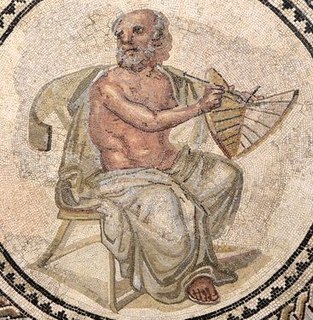
Anaximander was a pre-Socratic Greek philosopher who lived in Miletus, a city of Ionia. He belonged to the Milesian school and learned the teachings of his master Thales. He succeeded Thales and became the second master of that school where he counted Anaximenes and, arguably, Pythagoras amongst his pupils.

A cyclops, in Greek mythology and later Roman mythology, is a member of a primordial race of giants, each with a single eye in the center of his forehead. The word cyclops literally means "round-eyed" or "circle-eyed".

The Trojan Horse is a story from the Trojan War about the subterfuge that the Greeks used to enter the independent city of Troy and win the war. In the canonical version, after a fruitless 10-year siege, the Greeks constructed a huge wooden horse, and hid a select force of men inside including Odysseus. The Greeks pretended to sail away, and the Trojans pulled the horse into their city as a victory trophy. That night the Greek force crept out of the horse and opened the gates for the rest of the Greek army, which had sailed back under cover of night. The Greeks entered and destroyed the city of Troy, ending the war.

The Chimera according to Greek mythology, was monstrous a fire-breathing hybrid creature of Lycia in Asia Minor, composed of the parts of more than one animal. It is usually depicted as a lion, with the head of a goat arising from its back, and a tail that might end with a snake's head, and was one of the offspring of Typhon and Echidna and a sibling of such monsters as Cerberus and the Lernaean Hydra.

Mimnermus was a Greek elegiac poet from either Colophon or Smyrna in Ionia, who flourished about 630–600 BC. He was strongly influenced by the example of Homer yet he wrote short poems suitable for performance at drinking parties and was remembered by ancient authorities chiefly as a love poet. Mimnermus in turn exerted a strong influence on Hellenistic poets such as Callimachus and thus also on Roman poets such as Propertius, who even preferred him to Homer for his eloquence on love themes. His work was collected by Alexandrian scholars in just two "books" and today only small fragments survive. The fragments confirm the ancient estimate of him as a "consummate poet" but also indicate that he was a "sturdier character" than the indulgent love poet he was assumed to be by various ancient commentators. Almost no reliable, biographical details have been recorded. One ancient account linked him romantically with a flute girl who subsequently gave her name, Nanno, to one of his two books.
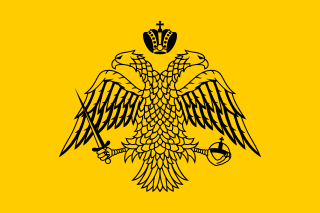
The name Greek Orthodox Church, or Greek Orthodoxy, is a term referring to the body of several Churches within the larger communion of Eastern Orthodox Christianity, whose liturgy is or was traditionally conducted in Koine Greek, the original language of the Septuagint and the New Testament, and whose history, traditions, and theology are rooted in the early Church Fathers and the culture of the Byzantine Empire. Greek Orthodox Christianity has also traditionally placed heavy emphasis and awarded high prestige to traditions of Eastern Orthodox monasticism and asceticism, with origins in Early Christianity in the Near East and in Byzantine Anatolia.
The Eleatics were a pre-Socratic school of philosophy founded by Parmenides in the early fifth century BC in the ancient town of Elea. Other members of the school included Zeno of Elea and Melissus of Samos. Xenophanes is sometimes included in the list, though there is some dispute over this. Elea, whose modern-day appellation is Velia, was a Greek colony located in present-day Campania in southern Italy.

Greek mathematics refers to mathematics texts and advances written in Greek, developed from the 7th century BC to the 4th century AD around the shores of the Eastern Mediterranean. Greek mathematicians lived in cities spread over the entire Eastern Mediterranean from Italy to North Africa but were united by culture and language. Greek mathematics of the period following Alexander the Great is sometimes called Hellenistic mathematics. The word "mathematics" itself derives from the Ancient Greek: μάθημα, translit. máthēmaAttic Greek: [má.tʰɛː.ma]Koine Greek: [ˈma.θi.ma], meaning "subject of instruction". The study of mathematics for its own sake and the use of generalized mathematical theories and proofs is the key difference between Greek mathematics and those of preceding civilizations.
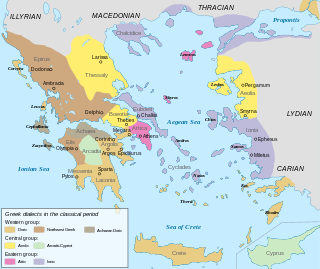
Ancient Greek in classical antiquity, before the development of the common Koine Greek of the Hellenistic period, was divided into several varieties.
The Little Iliad is a lost epic of ancient Greek literature. It was one of the Epic Cycle, that is, the "Trojan" cycle, which told the entire history of the Trojan War in epic verse. The story of the Little Iliad comes chronologically after that of the Aethiopis, and is followed by that of the Iliou persis. The Little Iliad was variously attributed by ancient writers to Lesches of Pyrrha, Cinaethon of Sparta, Diodorus of Erythrae, Thestorides of Phocaea, or Homer himself. The poem comprised four books of verse in dactylic hexameter, the heroic meter.
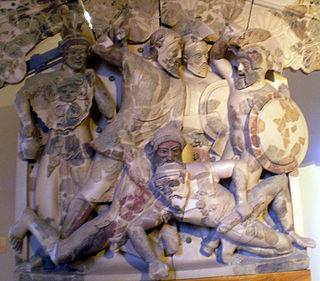
The Theban Cycle is a collection of four lost epics of ancient Greek literature which related the mythical history of the Boeotian city of Thebes. They were composed in dactylic hexameter verse and were probably written down between 750 and 500 BC.
Cyclic Poets is a shorthand term for the early Greek epic poets, approximate contemporaries of Homer. We know no more about these poets than we know about Homer, but modern scholars regard them as having composed orally, as did Homer. In the classical period, surviving early epic poems were ascribed to these authors, just as the Iliad and Odyssey were ascribed to Homer. Together with Homer, whose Iliad covers a mere 50 days of the war, they cover the complete war "cycle", thus the name. Most modern scholars place Homer in the 8th century BC. The other poets listed below seemed to have lived in the 7th–5th centuries BC. Excluding Homer's, none of the works of the cyclic poets survive.
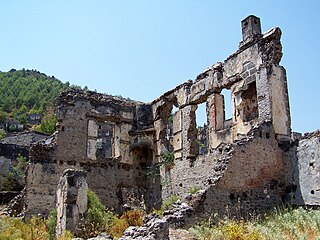
Kayaköy, anciently known in Greek as Karmilassos, shortened to Lebessos and pronounced in Modern Greek as Livissi, is presently a village 8 km south of Fethiye in southwestern Turkey in the old Lycia province. From Ancient Greek the town name shifted to Koine Greek by the Roman period, evolved into Byzantine Greek in the Middle Ages, and finally became the Modern Greek name still used by its townspeople before their final evacuation in 1923. In late antiquity the inhabitants of the region had become Christian and, following the East-West Schism with the Catholic Church in 1054 AD, they came to be called Greek Orthodox Christian. These Greek-speaking Christian subjects, and their Turkish-speaking Ottoman rulers, lived in relative harmony from the end of the turbulent Ottoman conquest of the region in the 14th century until the early 20th century, when the rise of nationalism led to persecution of minorities within the Ottoman realm and the eventual creation of modern Turkey by the Turkish National Movement.
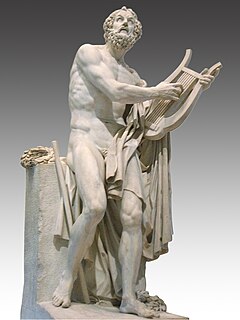
The Life of Homer, whose unknown author is referred to as Pseudo-Herodotus, is one among several ancient biographies of the Greek epic poet, Homer. It is distinguished from the others by the fact that it contains, in its first lines, the claim to have been compiled by the early historian Herodotus:
Herodotus of Halicarnassus wrote the following history of Homer's background, upbringing and life, and sought to make his account complete and absolutely reliable.
Thestorides of Phocaea was a legendary or semi-legendary early Greek poet, one of those to whom the epic Little Iliad was ascribed.

The ancient accounts of Homer include many passages in archaic and classical Greek poets and prose authors that mention or allude to Homer, and ten biographies of Homer, often referred to as Lives.

The Merchant's House Museum, known formerly as the Old Merchant's House and as the Seabury Tredwell House, is the only nineteenth-century family home in New York City preserved intact — both inside and out. Built "on speculation" in 1832 by Joseph Brewster, a hatter by trade, it is located at 29 East Fourth Street, between Lafayette Street and the Bowery in Manhattan. It became a museum in 1936, founded by George Chapman, a cousin of the family who once lived there.
Rediscovering Homer is a 2006 book by Andrew Dalby. It sets out the problems of origin, dating and authorship of the two ancient Greek epics, Iliad and Odyssey, usually attributed to Homer.

Greek mythology is the body of myths originally told by the ancient Greeks. These stories concern the origin and the nature of the world, the lives and activities of deities, heroes, and mythological creatures, and the origins and significance of the ancient Greeks' own cult and ritual practices. Modern scholars study the myths in an attempt to shed light on the religious and political institutions of ancient Greece and its civilization, and to gain understanding of the nature of myth-making itself.

















